The young man in the dirty jeans and faded navy T-shirt wouldn’t tell me his name. I’d asked the group of refugees hanging around the park in front of the Belgrade bus station if any one spoke English and they’d pushed him forward. He was willing to speak to me on condition of anonymity, so I’ll call him David.
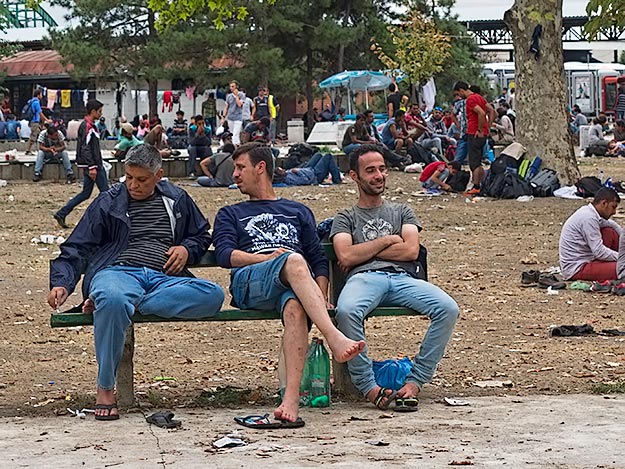
David is from Syria, one of thousands of refugees who are currently making their way through the Balkans in search of a better life. When I asked him why he left Syria he grinned, revealing one dimple and crooked, tobacco stained teeth. “There is nothing in Syria. No water, no electricity, no food.” Though he couldn’t have been older than 20, his story is already four years in the making. He fled to Turkey, where he spent two years working at any job he could get, in order to save enough money to get to Europe. Over the last two years, he traversed Greece and Macedonia, arriving in Serbia just a couple of weeks earlier.
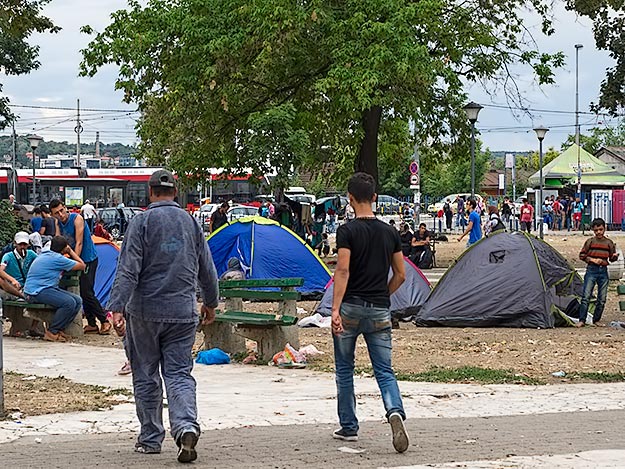
He and his friends, all of whom appear to be in their early twenties, clustered around an ancient oak tree in the park, hanging on one another as much for moral support as camaraderie. The boys were all elbows and dark eyes and olive skin, and despite the hardship of having no home and no idea what tomorrow would bring, they seemed cheerful. “Where will you go?” I asked. “To Germany,” he replied unhesitatingly. “You will go through Hungary?” I pressed. When he nodded, I asked if he knew that the Hungarian government had built a fence along the border between the two countries. He laughed, his hand making a going over, going under, going around motion. “We will cross. I know a guy…” So young. So positive. I wondered if could I have been so brave at his age.
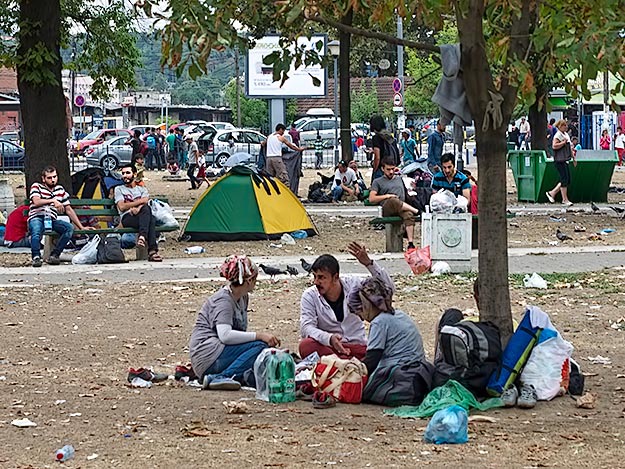
I wished David and his friends good luck and moved on. Another woman, also from Syria, moved up to the fence. In broken English, she introduced me to her family one by one, though she too refused to have photos taken. When I inquired why they had left she used almost exactly the same words as David. “There is nothing.”
A bit further on, three little girls backed up to a row of metal trash bins, pulled their pants down to their knees and squatted. They defecated in public, then turned and picked up their feces with a plastic bag and deposited them into the bins. The bus station public toilet was just steps away, but it cost money.
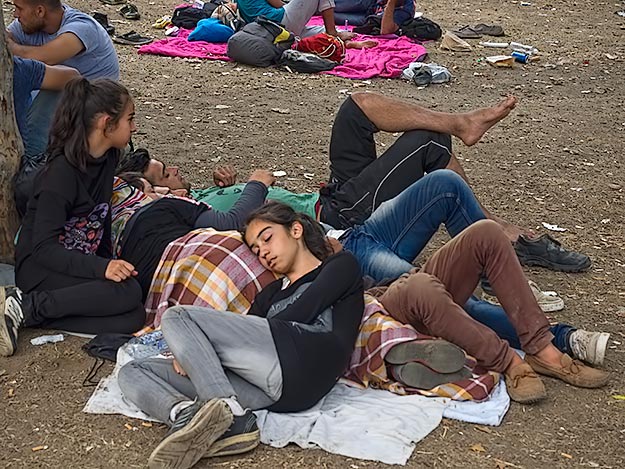
Some of the refugees had tents but the overwhelming majority appeared to have only the clothes they were wearing or, at most, a small backpack. Nearby, a group of older men used pieces of cardboard to sweep litter away from the base of a tree, creating a clean place to bed down for the night. At least they would be able to sleep comfortably; the deadly heat wave that had been plaguing Europe for more than a month had finally abated.
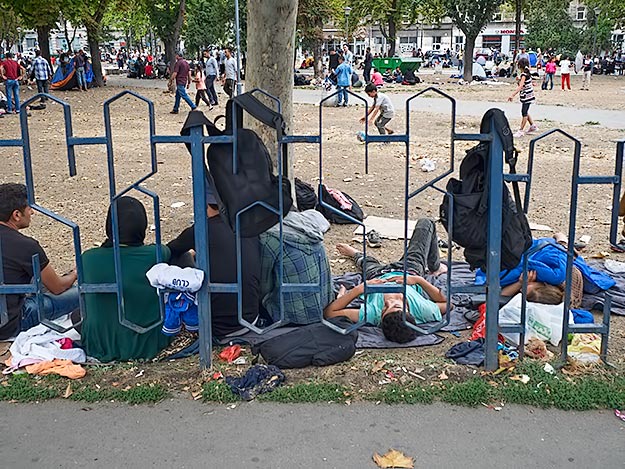
I continued to the train station, where I encountered even more refugees. The local taxi drivers leaned against their cabs, arms crossed, surveying the situation. One of them told me more than 40,000 refugees had come through Belgrade. “They are fleeing war and starvation in Syria, Afghanistan, Somalia. It is very sad.” I asked if the police or government were trying to stem the tide of refugees through Syria. “Oh no, they do not want to stay here. They are just passing through on their way to Western Europe.” I considered this for a moment and realized how kind it was. And then I thought once again about the border fence that the Hungarian government had built.
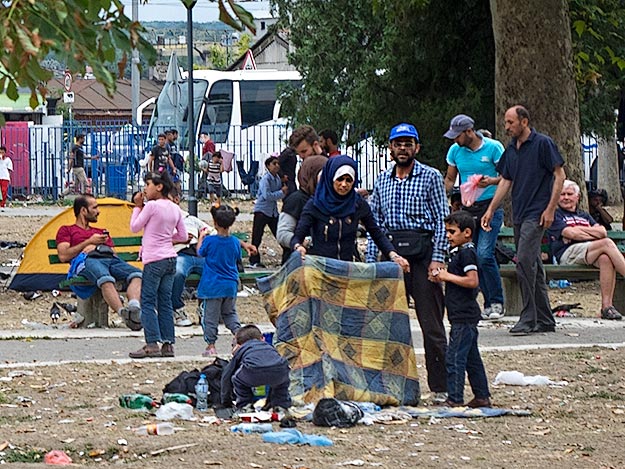
Not long after I my interview, 84 people were found dead in the back of a truck abandoned by human traffickers on a highway in Austria. When I learned they were mostly Syrian and Iranian refugees, I wondered about David. Was he among those who suffocated in the back of this small delivery truck? I will never know.

trying again because first time said the system thought I might be a at risk for posting anyway, what I posted was: with tears, I too leave a flower
how do I contact you?
Hi Sylvia – sent you an email a little while ago. If you don’t see it, check your spam folder.
Hopefully, we would never know how hard is it to be forced to leave behind everything you have, to leave the place where you built your life and memories of that place only because you want you and your family to be safe and secure.
Agreed Anca. Those who are espousing such hatred have obviously never been faced with such heart-wrenching decisions.
I leave a flower here
with tears I too leave a flower.
Really hard all this situation that is happening !!! the war destroyed their country i hope that this people can find a new future
Really sad state of affair. It’s good that you spoke to them. Let’s hope their miseries come to an end sooner than later, though I don’t see the problem getting over any time soon.
Hi Shailender: I hope you’re wrong, but I suspect you’re correct. This is going to take a long time to sort out, and my prayers are with them.
Thanks for his.
I read a blog post yesterday from a travel blogger in this end of Europe. A right-wing, sickening, disgusting hate speech. What was even more scary were the comments supporting his inhumane attitude.
Lets just help these people shall we? Why can’t we all just share and stop bickering? They are welcome in my country, by me, and many more. We live in Romania but the UK is home, many come to the UK because they don’t feel safe in mainland Europe ( I’ve asked, that’s the answer I got) . Hate is running high and it scares me.
So you are hosting a family or two?
Let us know.
I wonder what you would say if a multitude of people came through the door of your home and demanded that you give them every necessity of life for free.
I wonder if you would say, ” Come on in. After you get settled with everything I give you, I will pay for your relatives to come a nd live in my home. Ill be happy to pay for them too.”
I wonder if you know that Sweden is now the rape capital of the world, 2nd to South Africa, whereas Sweden had a statistical “0” rape incidence prior to the invaders.
I could go on for paragraphs, but what would be the use.
Since you are one of those who thinks you can call someone racist and that concludes the discussion and that in that tiny functioning part of your brain, since your being offended must surely mean you’re right, I won’t waste my time.
I know what you mean Alyson. But I really believe hate happens because of fear. We are so fearful of others who we see as being “different” that we can’t see that people everywhere are much the same. We may speak a different language or practice a different religion, but at out core we all want the same things: a safe place to live, enough food on the table, clothing to wear, freedom, a way to earn a decent living, and a better life for our children.
Wow, the last part of this post is haunting. Thank you for sharing their stories and helping us understand what daily life is like for some of the refugees trying to make their way to a better life.
Hi Jenna: Yes, it was a hard one to write, and I still get emotional when I think about their plight. Thanks for your comment, much appreciated.
Thanks for sharing your experience with these desperate people…and for taking the time to speak with them and describing your observations in such a sensitive way.
You’re welcome Carol. I just could not ignore the situation, especially after I began reading about the horrible way they were being treated by Hungary’s PM Orban.
Thank you for this reminder that these aren’t a mass of refugees but individuals and families trying to survive as we all would. It is s helpless feeling to observe this situation but motivating to try and help in some way.
You’re welcome Shelley. My heart goes out to them.